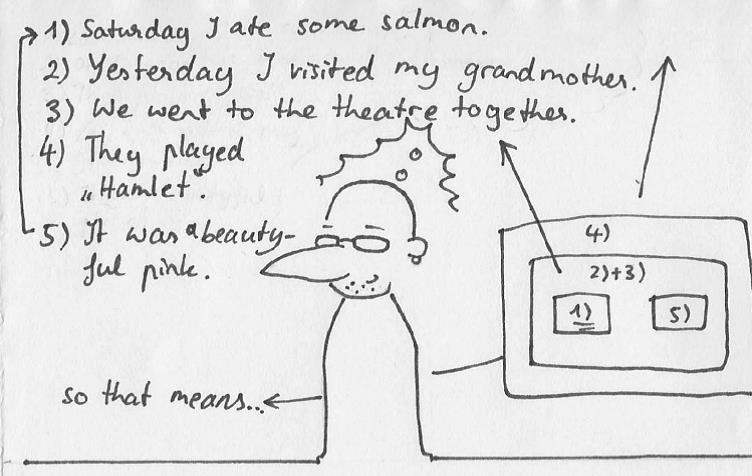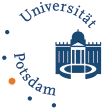
Kontakt
Prof. Dr. Malte Zimmermann
Institut für Linguistik
Universität Potsdam
Karl-Liebknecht-Str. 24-25
D-14476 Potsdam
Tel.: +49-(0)331-977-2319
Fax: +49-(0)331-977-2087
Email to: mazimmer_at_ uni-potsdam.de
About Me
-
I am professor of semantics and grammar theory at the Linguistic Department of Potsdam University.
I am interested in the language capacity of human beings in general, and in the relation of linguistic form and meaning, aka semantics, in particular.
Among many other things, I am interested in quantification, tense, question semantics, discourse particles, and information structure, ... sometimes I even teach discourse structure (together with my colleague Tatjana Scheffler) ...
 I am also a faculty and board member of the African Linguistics School (ALS),
which takes place biannually in different West African countries and makes a major contribution to the dissemination of knowledge in all areas
of formal linguistics to talented and aspiring youg African scholars
I am also a faculty and board member of the African Linguistics School (ALS),
which takes place biannually in different West African countries and makes a major contribution to the dissemination of knowledge in all areas
of formal linguistics to talented and aspiring youg African scholarsMe and the members of my Potsdam semantics group (Peter Sutton, Giuliano Armenante, Jeanne Lecavelier, Anna Struck, Carla Bombi) are also extremely interested in semantically under-researched languages of West Africa (Chadic, Kwa, Grasfield Bantu) which involves field research in Ghana, Cameroon and Nigeria, ... and which is less adventurous than you would think ...
 Together with my dear colleague Edgar Onea (Graz), I directed the experimental research project ExQ
on the (non-)exhaustive interpretation of embedded questions across European (English, German, Hungarian, Romanian) and Non-European (Hausa, Akan) languages.
This project was funded by the DFG as part of the priority program SPP 1727 XPrag.de on experimental pragmatics.
Together with my dear colleague Edgar Onea (Graz), I directed the experimental research project ExQ
on the (non-)exhaustive interpretation of embedded questions across European (English, German, Hungarian, Romanian) and Non-European (Hausa, Akan) languages.
This project was funded by the DFG as part of the priority program SPP 1727 XPrag.de on experimental pragmatics. Currently, I supervise an SFB-project on the Limits of Variability in Interpretation, in which we look at scope ambiguities, reconstruction, the interpretation of bare NPs, and the interpretation of Serial Verb Constructions in a range of languages (German, English, Akan, Igbo, Medumba etc.).
Apart from linguistics, I enjoy being and travelling with my family, including interesting outdoor adventures such as hiking, cycling, and canooing. Last but not least, I am fostering an undying love for the football team of FC St Pauli, who may not always be great - but they are trying!
Recent and not so recent talks
- How many underlying objects in object-sharing
serial verb constructions? New evidence from suspended pro-drop in Akan; Doreen Georgi, Anna Struck & Malte Zimmermann.
GLOW 47, Goethe Universität Frankfurt March 27, 2025
This talk is a follow-up on Amaechi, Duah and Zimmermann (2023) and probes deeper into the structure of covertly coordinating SVCs of the form SUBJ V1 OBJ1 V2 OBJ2 in Akan. Based on the observation that prodrop with OBJ-pronouns is blocked by subsequent VP-adjuncts, change-of-state predicates, or secondary predicates, we show that by systematically controlling these factors for OBJ1- and OBJ2-pronouns we can systematically make (i.) both pronouns show up overtly, (ii.) only the OBJ1-pronoun show overtly; (iii.) only the OBJ2-pronoun overtly; (iv.) both pronouns be pro-dropped. Our investigations show that run-of-the-mill SVCs with two transitive verbs in Akan do not involve true OBJ-argument sharing, but two covertly coordinated AspPs with two independent OBJ-positions. - (Seeming) OBJ-sharing SVCs in Igbo and Akan: A case
of hidden variability; Amaechi, M., Duah, R. A. & M. Zimmermann. 2023. LSA-ALS Workshop on Complex Predication, UMASS, Amherst 28 June 2023
In this talk we compare two surface-identical Serial Verb Constructions (SVCs) of the form Kofi cookV1 chicken eatV2 in Akan and Igbo (Kwa). Applying a range of syntactic and semantic diagnostics, we show that - despite first appearances - the two SVC-constructions come with a different syntax and semantics. Whereas the Igbo SVCs involve a complement structure expressing a single complex (macro-)event (as found, e.g., with resultatives and lexical causatives in English), there surface-parallel Akan counterparts involve covert coordination with a independent object NP after each verb. The fact The second object pronoun after V2 does not show in Akan because inanimate pronouns must be pro-dropped (in the general case). Since Igbo is strictly non-prodrop, the absence of an object NP/pronoun after V2 is indicative of an SVC with proper OBJ-argument-sharing (Baker 1989, Stewart 1998). The talk shows that care is required in the syntactic and semantic investigation of SVCs in taking independent structural aspects into account. Closer scrutiny may show that surface similarities give way to Hidden Variability. - Cross-linguistic variability (and uniformity) in focus-background partitioning;
Academy Colloquium Language Variation in Action, KNAW, Trippenhuis, February 19, 2016
This invited talk provides an overview of variability and uniformity in focus-background partitioning. Drawing mostly on empirical data gathered in the Potsdam-Berlin-based SFB632 "Information Structure", I discuss various ways in which languages can formally express focus-nackground partitioning. Next to well-known focusing strategies, special attention is paid to so-called 'backgrounding strategies', which can either co-occur with explicit focus marking or else occur in isolation in the absence of explicit focus marking. A background-only marking language is the West Chadic language Ngamo, as described in Mirs Grubic's (2015) PhD dissertation. - Salient situations: A semantic reanalysis of RELative marking in Hausa (Chadic);
GWIS 3: Under one roof - Sharing a form with focus, Karl-Franzens-Universität Graz, 25-26 September, 2015
in this invited talk, I propose a semantic analysis of so-called "relative marking" in Hausa, which has been traditionally analyzed as a semantically vacuous, purely structural reflex of A-bar movement (Tuller 1986). On the alternative semantic account proposed, relative marking on the person-aspect complex has semantic import: REL-marking presupposes the contextual presence of a salient situation constraining the topic situation of the REL-marked clause.
The contents of this talk now form part of Zimmermann & Duah (2022) in Proceedings of TripleA8, NUS Singapore
Positions
- since 2011 Full Professor of Semantics and Theory of Grammar, Universität Potsdam
- 2009-2015 Director of Collaborative Research Centre SFB 632 Information Structure
- 2006 Junior professor of Semantics, Universität Potsdam
- 2003-2006 Research assistant in project B2 Focus in the Chadic languages, SFB 632 Information Structure, Humboldt University Berlin
- 2002-2003 Postdoc in graduate program "Sentence Types: Variation and Interpretation", University Frankfurt/Main
Service
- 2022-present Board Member African Linguistic School
- 2011-present Board Member Triple A: Fieldwork-based semantics of African, Asian, and Austronesian languages
- 2022-present Associate Editor Natural Language and Linguistic Theory
- 2016-2021 Associate Editor Linguistics and Philosophy
Research Grants
- 2017-2021, SFB1287 Limits of Variability in Language, C02 Limits of variability in interpretation, (Co-PU with A. Koller, Saarbrücken)
- 2017-2020 SPP 1727 XPRAG.de, Exhaustiveness in embedded questions across languages, (Co-PI with E. Onéa, Göttingen)
- 2014-2017, SPP 1727 XPRAG.de, Exhaustivity in it-clefts, (Co-PI with E. Onéa, Göttingen)
- 2012-2016, DFG-Network Questions in Discourse, (with E. Onéa, Göttingen)
- 2007-2015, SFB632 Information Structure, A05 Focus realization, Focus interpretation and focus use from a cross-linguistic perspective
- 2007-2011, SFB632 Information Structure, D02 Typology of information structure , (co-PI with Gisbert Fanselow and Caroline Féry)
Education
- 2002 Ph.D. in Allgemeiner Sprachwissenschaft/ General Linguistics, Universiteit van Amsterdam
Dissertation title: 'Boys Buying Two Sausages Each'- On the Syntax and Semantics of Distance Distributivity.LOT Dissertation Series 62. Utrecht. - 1998 M.A. in Deutscher Sprache und Linguistik/Anglistik/Philosphie, Universität zu Köln
- 1989 Abitur, Gymnasium Athenaeum, Stade/ Niedersachsen
Teaching
- As a full professor at the Linguistic Department of the Universität Potsdam, I regularly teach courses in the department's BSc- and MSc-programmes in linguistics on a wide variety of topics, ranging from Formal Semantics and Pragmatics, via the Semantics of African Languages and Structural Aspects of African Languages to Methods of Semantic Data Elicitation (Fieldwork, Questionnaires, Experiments, Storybaords) to German Dialects and Structural Specifics of the Berlin-Brandenburg Variants.
In addition, I am a faculty and board member of the African Linguistics School (ALS). I also taught courses at the GLOW summer school of 2006 in Stuttgart, the ESSLLI summer schools of 2009 (Bordeaux) and 2011 (Ljubljana), and the LOT summer school in Leiden 2024.
LOT Zomerschool Leiden 2024
- In this invited summer school course on The Semantics of (In)Definite DPs, with special focus on West African, I provide an
overview of recent advances in the formal semantric modelling of the meaning of DEF- and INDEF-markers and bare NPs in a range of West African languages
(Akan, Hausa, Ga, Wolof, etc.). We discuss subtle cross-linguistic differences in the meaning of overt DEF- and INDEF-marker sin Akan and Hausa, and the corresponding
effects on the interpretation of bare NPs under competition and blocking (Chierchia 1998, Dayal 2004).
- ClassI: Weak and Strong DEFs
- ClassII: Indexed Definites vs Demonstratives
- ClassIII: Indefinites and Existential Quantification
- ClassIV: Case Study I - Indefinites in Hausa and Ga (and Wolof)
- ClassV: The meaning of INDEFS, DEFs, and bare NPs in Akan
PhD Supervision - completed
- 2024 Giuliano Armenante (UP): Variability in the composition of Tense and Attitude Reports
- 2024 Eva Shipova (UP): Formal analysis of èto-clefts in Russian: syntax and semantics
- 2023 Mareike Philipp (UP): Quantifier Scope Ambiguities in English, German, and Asante Twi (Akan): Structural and Pragmatic Factors
- 2020 Jens Hopperdietzl (HU Berlin; co-supervision with Artemis Alexiadou): Resultatives - A view from Oceanic Verb Serialization
- 2020 Joseph DeVeaugh-Geiss (UP): Cleft Exhaustivity: A Unified Approach to Inter-Speaker and Cross-Linguistic Variability
- 2018 Lena Karvovskaya (Universiteit Leiden, co-supervision with Johan Rooryck): The typology and formal semantics of adnominal possession
- 2016 Agata Renans (UP): Exhaustivity. On exclusive particles, clefts, and progressive aspect in Ga (Kwa)
- 2015 Anne Mucha (UP): Temporal interpretation and cross-linguistic variation. A formal semantic analysis of temporal and aspectual reference in Hausa and Medumba
- 2015 Mira Grubic (UP): Focus and Alternative Sensitivity in Ngamo (West-Chadic)
- 2014 Vera Hohaus (Universität Tübingen; co-supervision with Sigrid Beck): "Context and Composition: Value Assignments to Free Functional Variables"
- 2025 -- Jeanne Lecavelier. Complement selection and question embedding.
- 2025 -- Anna Struck. Serial Verb Constructions and exceed-based degree expressions in West African languages.
PhD Supervision - in progress
- Dominique Blok (Universiteit Utrecht), 2019, Scope Oddity - On the semantic and pragmatic interactions of modified numerals, negative indefinites,focus operators, and modals
- Vadim Kimmelman (Universiteit van Amsterdam), 2014, Information Structure in Russian Sign Language and Sogn Langauge of the Netherlands
- Katerina Souckova (Leiden Universiteit), 2011, Pluractionality in Hausa
PhD External Committee member
Actual courses: On Sabbatical
Previous Courses (selected)

